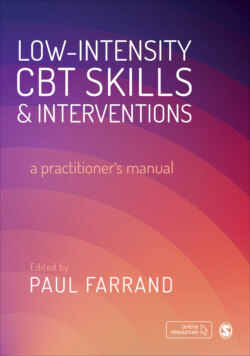Читать книгу Low-intensity CBT Skills and Interventions - Группа авторов - Страница 52
На сайте Литреса книга снята с продажи.
Key Point
ОглавлениеMain types of LICBT assessment:
Problem formulation: Derive an initial shared understanding of the presenting problems captured in a problem statement and used to inform decision-making and treatment planning.
Screening/Triage: Undertaken to determine if a person is suitable for a service and if so the appropriate step in the stepped care service delivery model (Chapter 4) and determine if urgency is required during allocation due to elevated levels of risk.
Whilst practitioners may be expected to conduct either of these forms of assessment within service, there is debate surrounding the consistency of screening/triage assessment within LICBT working. Working within the stepped care model of service delivery (Bower and Gilbody, 2005) the assumption is that in the absence of any information suggesting otherwise, patients should undertake an LICBT problem formulation assessment. Following assessment, the patient should continue with treatment at Step 2 where appropriate or be referred to another step consistent with NICE Guidance (NCCMH, 2018). Given service efficiency and cost-benefits associated with this way of working (Chapter 1) resulting in reduced waiting times within the Improving Access to Psychological Therapies programme (IAPT; NCCMH, 2018), it is unclear what additional benefits arise from the LICBT practitioner workforce undertaking screening/triage assessments. Benefits are further questioned given that screening/triage assessments adopted within Stratified Care service delivery models result in patients receiving a greater number of treatment sessions but similar outcomes to stepped care (van Straten et al., 2006).
